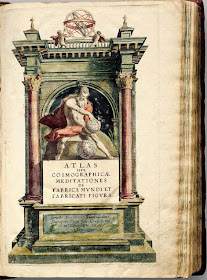Gerardus Mercator (1512-1524) is considered the father of the modern world atlas. Gerardus was a Cartographer that worked with his own collection of precision-mathematical instruments and also constructed several terrestrial globes, or armilar spheres (there are around 22 existing globes around the world, manufactured by Gerardus). All the persons –I include myself- that studied Oceanic Navigation know Gerardus Mercator because he introduced a revolutionary idea: the concept that a course can be established maintaining the same angle with all meridians crossed among starting and ending point with a single line, making very easy to obtain latitude and longitude (therefore position) with only speed and time of navigation. This method has some inconveniences at high latitudes, but is very accurate when navigation is near (and not so) to Ecuador.
Mercator developed the first detailed map of Palestina, in his "Atlas Cosmographicae Meditationes de Fabrica Mundi".
Gerardus Mercator
Some samples below from Mercator's Atlas. Please check America maps and consider that was discovered only 50-60 years before by Spaniards, thinking that they really arrived to Asia (Cipango) or Oriental Indias. Some details in North and South America cartography surprised me a lot, taking in account that exploration was intense in Central America and Cuba, but not so in other areas like north and south, at least during the first decades of 16th century.
Wikipedia link for Gerardus Mercator BIO (good enough!) is here. Have to say that I do not agree with some of the definitions and aspects provided in this link, like following sentence, which is located on wiki’s head: “This proved very useful to many later navigators who could (using his map) sail across the entire ocean on a straight path (called a rhumb line)”. Accurate description of Mercator principle has been defined in the first paragraph of this post (bold).
There’s a reference in Wikipedia for an online edition of Mercator’s Atlas (Britannica Online Encyclopedia) but doesn’t work: seems like the link is broken, at least I tried in 3 different locations without success. There’re some other online possibilities to admire Mercator’s Atlas like “turn-the-pages” digital editions but have the disadvantage that one must be internet connected...


No comments:
Post a Comment